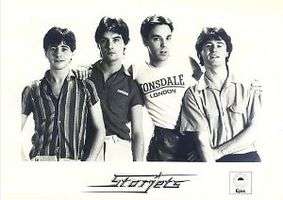The Starjets
The Starjets were a late 1970s power pop/group from Belfast, Northern Ireland.
The Starjets | |
|---|---|
 | |
| Background information | |
| Also known as | Tango Brigade |
| Origin | Belfast, Northern Ireland, UK |
| Genres | Punk rock, power pop |
| Years active | 1976–1980 |
| Labels | Epic |
| Associated acts | The Adventures |
| Past members | Terry Sharpe Paul Bowen Sean Martin Liam L'Estrange |
The band consisted of guitarist/vocalist Terry Sharpe, guitarist/vocalist Paul Bowen, bassist Sean Martin and drummer Liam L'Estrange. The group sported a mix of punk and mainstream pop influences. Early sets consisted of such 1960s pop standards as "Please Please Me" by The Beatles and "Sugar, Sugar" by The Archies at a time when such light, happy fare was an anathema to the punk community. The band also stood out from their punk contemporaries with their tight, sophisticated harmonies. Appropriately, they opened for groups as diverse as Teen Idols the Bay City Rollers and aggressive punk rockers Stiff Little Fingers. Because of their clean-cut, boys-next-door image, sugary songs, and amiable persona, they were sometimes even tagged the "Bay City Rollers of punk".
The group secured a major record label recording contract with Epic Records; they were signed by Muff Winwood. They released a number of singles in 1979, with their only chart hit being "War Stories" b/w "Do the Push", which peaked at No. 51 on the UK Singles Chart.[1] The A-side is a celebration of World War II comic book stories, such as those of Sgt. Fury. They released one album, 1979's God Bless the Starjets, but it failed commercially. Following the release of the "Shiraleo" single in March 1980, the band changed its name to Tango Brigade and released one more single, before finally splitting up permanently. After a brief stint performing vocal duties with the Angelic Upstarts (most notably taking lead vocals on the song "Reason Why?" from the album of the same title), Sharpe found greater success in the 1980s with the rock group The Adventures.
References
- Roberts, David (2006). British Hit Singles & Albums (19th ed.). London: Guinness World Records Limited. p. 524. ISBN 1-904994-10-5.
External links
- Biography on the Mod-Pop-Punk Archives (via the Wayback Machine)
- Paul Bowen
- Discussion on BBC Northern Ireland's "The Saturday Magazine"
- Review of God Bless the Starjets in Allmusic.
- Review of God Bless the Starjets in Trouser Press